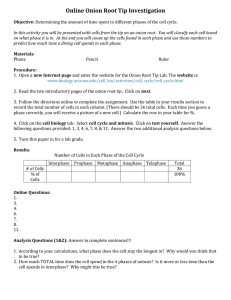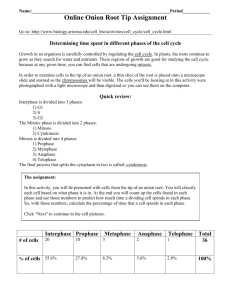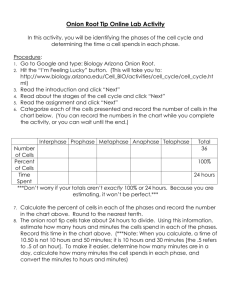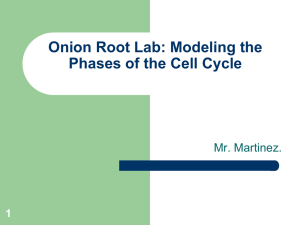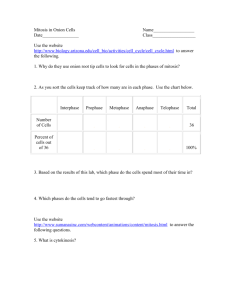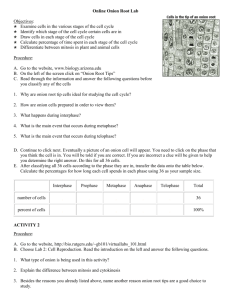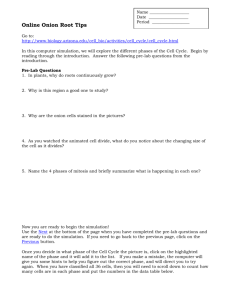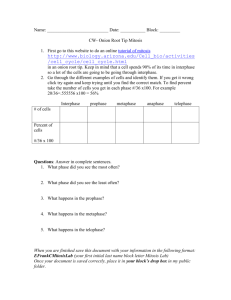Lesson-45-51
advertisement
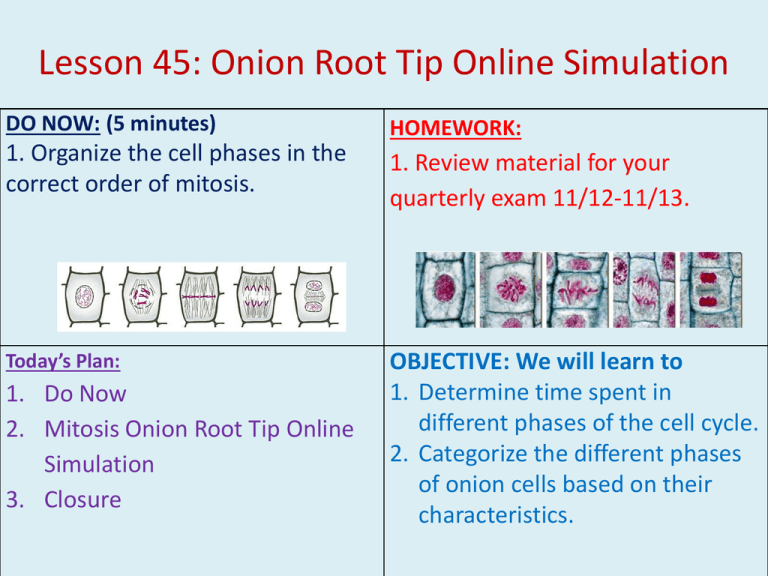
Lesson 45: Onion Root Tip Online Simulation DO NOW: (5 minutes) HOMEWORK: 1. Organize the cell phases in the correct order of mitosis. 1. Review material for your quarterly exam 11/12-11/13. Today’s Plan: OBJECTIVE: We will learn to 1. Determine time spent in different phases of the cell cycle. 2. Categorize the different phases of onion cells based on their characteristics. 1. Do Now 2. Mitosis Onion Root Tip Online Simulation 3. Closure Mitosis Onion Root Tips • Go to the link: http://goo.gl/xBFNDV • Complete the activity. • Record your data in the chart. Closure • Which takes longer, interphase or mitosis? Lesson 46: Onion Root Microscope DO NOW: (5 minutes) HOMEWORK: 1. Why do you think we use the onion root tip to study mitosis? 1. ***Review material for your quarterly exam 11/1211/13.*** Today’s Plan: OBJECTIVE: We will learn to 1. Determine time spent in different phases of the cell cycle. 2. Categorize the different phases of onion cells based on their characteristics. 1. Do Now 2. Mitosis Onion Root Tip Microscope Lab 3. Closure Onion Root Tip- What should you see? Closure Based on the evidence observed in this activity, what other plant structure do you predict will have an area of rapidly dividing cells similar to the root tip? Explain your reasoning. Lesson 47: Onion Root Microscope Day 2 DO NOW: (5 minutes) HOMEWORK: 1. Read step 3 of the Observing Mitosis Lab. 2. Describe the cells that you will be observing. 1. ***Review material for your quarterly exam 11/1211/13.*** Today’s Plan: OBJECTIVE: We will learn to 1. Determine time spent in different phases of the cell cycle. 2. Categorize the different phases of onion cells based on their characteristics. 1. Do Now 2. Mitosis Onion Root Tip Microscope Lab 3. Closure Do Now Describe the cells that you will be observing. 1. Just above the root “cap” contains many new small cells. 2. The larger cells OF THIS REGION were in the process of dividing when the cell was made. 3. Make sure the zone of division is centered in scanning power before moving to low and high power! Onion Root Tip- What should you see? Lesson 47: Onion Root Microscope Day 2 DO NOW: (5 minutes) HOMEWORK: 1. Read step 9 of the Onion Root 1. ***Review material for your Tip Lab and predict what type of quarterly exam 11/12result you will find in terms of how 11/13.*** many cells will be in each stage. Be sure to explain your prediction using evidence. Today’s Plan: 1. Do Now 2. Mitosis Onion Root Tip Microscope Lab 3. Closure OBJECTIVE: We will learn to 1. Determine time spent in different phases of the cell cycle. 2. Categorize the different phases of onion cells based on their characteristics. Closure 1. Based on the evidence observed in this activity, what other plant structure do you predict will have an area of rapidly dividing cells similar to the root tip? Explain your reasoning. 2. What topics don’t you understand for the quarterly? Be specific! Extension Cell Cycle and Cancer Amoeba Sisters YouTube Video • https://www.youtube.com/watch?v=lpAa4TW jHQ4 (7:00) Mitosis: The Amazing Cell Process that Uses Division to Multiply! • https://www.youtube.com/watch?v=gwcwSZIf KlM (7:00). Lesson 48: Quarterly 1 Review DO NOW: (5 minutes) HOMEWORK: 1. With your lab group, come up 1. ***Quarterly exam with 2 questions for the class to TOMORROW.*** When you answer. come into class tomorrow, 2. Write these questions on the EVERYTHING away, in seat, CLASS whiteboard. *Make sure ready to start when the bell there are NO duplicates* rings. Today’s Plan: OBJECTIVE: We will learn to 1. Review experimental design, 1. Do Now homeostasis, biomolecules, 2. Quarterly 1 Review microscopes, lab safety, 3. Closure photosynthesis, and respiration to prepare for our assessment. Student Generated Questions 1 1. What is an example of a hypothesis? 2. Amino acids are the building block of what biomolecule? 3. What process occurs in the chloroplast? 4. What process occurs in the mitochondria? 5. What is a control variable? Control group? 6. What does homeostasis mean? 7. Define osmosis. Student Generated Questions 2 8. What is the difference between osmosis and diffusion? 9. What is concentration gradient? 10. What is fermentation? 11. Do plants go through aerobic and anaerobic respiration or just anaerobic? 12. What is the difference between the light dependent and independent reactions? Student Generated Questions 3 13. What are the four major biomolecules? 14. What is the effect of consuming biomolecules on the body? 15. How many ATP molecules do you get from aerobic respiration? Photosynthesis Respiration Closure 1. After our review, what questions do you have? Lesson 49: Quarterly 1 Day 1 DO NOW: (5 minutes) HOMEWORK: 1. Take out a number 2 pencil. 1. ***Quarterly exam 2. Put EVERYTHING away. TOMORROW.*** When you 3. If you prefer to take the exam at come into class tomorrow, a lab table, let me know. (6 EVERYTHING away, in seat, students maximum) ready to start when the bell rings. Today’s Plan: OBJECTIVE: We will learn to 1. Communicate our knowledge of the 1. Quarterly 1 Exam process of experimental design, homeostasis, biomolecules, microscopes, lab safety, photosynthesis, and respiration on an assessment with recall and data analysis questions. Lesson 50: Quarterly 1 Day 2 DO NOW: (5 minutes) HOMEWORK: 1. Take out a number 2 pencil. 2. Put EVERYTHING away. 3. If you prefer to take the exam at a lab table, let us know. (6 students maximum) Complete the Growth and Develop of Organisms Packet (Read and Answer Questions) **ALL 4 PAGES** -Due Monday Today’s Plan: OBJECTIVE: We will learn to 1. Quarterly 1 Exam 1. Communicate our knowledge of the process of experimental design, homeostasis, biomolecules, microscopes, lab safety, photosynthesis, and respiration on an assessment with recall and data analysis questions. Lesson 51: Mitosis Web Quest Day 1 DO NOW: (5 minutes) HOMEWORK: With your lab groups, use your - Study for Quiz Thursday on Cell whiteboards to create a short presentation Cycle and Mitosis explaining: Group 1: Interphase - After School: Tuesday-Thursday Group 2: Prophase - It is YOUR responsibility to make Group 3: Metaphase Group 4: Anaphase up missed classwork/labs Group 5: Telophase Group 6: An onion cell in between prophase and metaphase. Today’s Plan: 1. Do Now 2. Do Now Presentations 3. Mitosis Web Quest Part 1 4. Closure OBJECTIVE: We will learn to 1. Communicate our knowledge of each phase of cellular division. 2. Explain why it is important for the cell cycle to be strictly controlled. Closure 1. Why is it important for the cell cycle to be strictly controlled? 2. If damaged cells are not repaired, what happens to them? 3. What problem can develop if the cell cycle is not controlled?
